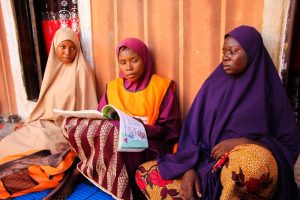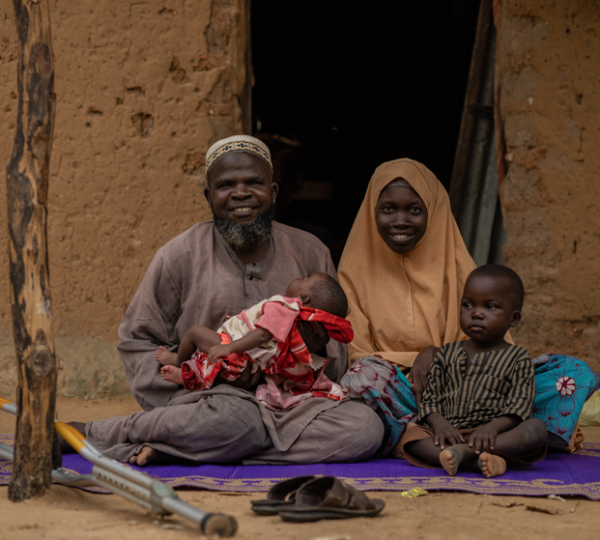How community health influencers are saving lives in crisis-affected northeast Nigeria
By Elizabeth Adeyemo
In northeast Nigeria, Community Health Influencers Promoters and Services (CHIPS) agents deliver essential, life-saving Maternal and Child Health (MNCH) and nutrition information and services to mothers.
Maternal mortality remains a major public health problem in Nigeria, with Northeast Nigeria contributing the highest to the national mortality ratio of 512 per 100 000 live births. Destroyed or non-functional health facilities, conflict and insecurity, and shortage of health workers and essential medicines hinder access to quality health services for pregnant women, newborns, and children in the northeastern part of Nigeria. Cultural or religious reasons, as well as transportation and treatment costs, further impede access.
To bridge the gaps in access to healthcare, improve health outcomes, and strengthen community Primary Health Care (PHC), the National Primary Health Care Development Agency established the Community Health Influencers, Promoters and Services (CHIPS) programme in 2018.
Society for Family Health is supporting the CHIPS Program in three local government areas (LGAs) in Borno state, including Biu, Kwaya Kusar, and Bayo LGAs, and two LGAs in Yobe, including Potiskum and Fika, through the Health Resilience Of North-East (HeRoN) project.
HeRoN aims to ensure crisis-affected communities in Borno and Yobe states have meaningful access to quality primary healthcare and nutrition services while contributing to the sustained capacity of health systems strengthening at the LGA level.
SFH HeRoN built the capacity of rigorously selected CHIPS agents to deliver quality reproductive, maternal, neonatal and child health (RMNCH) and nutrition messages and services, including MAMA-MUAC, to mothers in the communities.
In SFH HeRoN-supported states – Borno and Yobe, CHIPS agents are bridging the gap between healthcare services and the community. They are sensitizing households on RMNCH issues, such as antenatal care, immunisation, and family planning; mobilizing and referring complicated cases to the nearest health facilities, which are also supported by SFH HeRoN. They also promote healthy behaviours, including personal hygiene, through social and behavioural change communication activities.
Between January and August 2022, the 400 CHIPS agents supported by SFH-HeRoN registered and visited 28,789 pregnant women. They identified and referred 249 with pregnancy danger signs to health facilities, ultimately reducing pregnancy-related complications and death.
“Personally, I have gained a lot of knowledge on health and nutrition since I joined the CHIPS programme a year ago. I am now well respected in the community because I go house to house to give people, particularly expectant and new mothers, good information about their health,” explains Aisha Adamu, one of the CHIPS agents in Unguwan Alami, Kwaya Kusar LGA of Borno state. Aisha also conducts follow up to ensure expectant mothers go for antenatal care, deliver in a health facility, practice exclusive breastfeeding, family planning, and proper hygiene and sanitation. “I have gained respect, and that makes me happy, and the community itself is happy with me and what I am doing in the community,” says Aisha.

Through HeRoN, SFH is supporting CHIPS agents like Aisha to improve the health and well-being of women and their families across this region of Nigeria.
“I have benefitted so much. This is going to be my first delivery, and I have no information, but the CHIPS agent (referring to Aisha Adamu) brought a lot of information to me,” says Zainab Usman, one of the clients enrolled under Aisha. “Now I know how to take care of myself as I am pregnant. I know the danger signs to watch out for and that I should go for antenatal care and deliver in a health facility. Thank you!”




